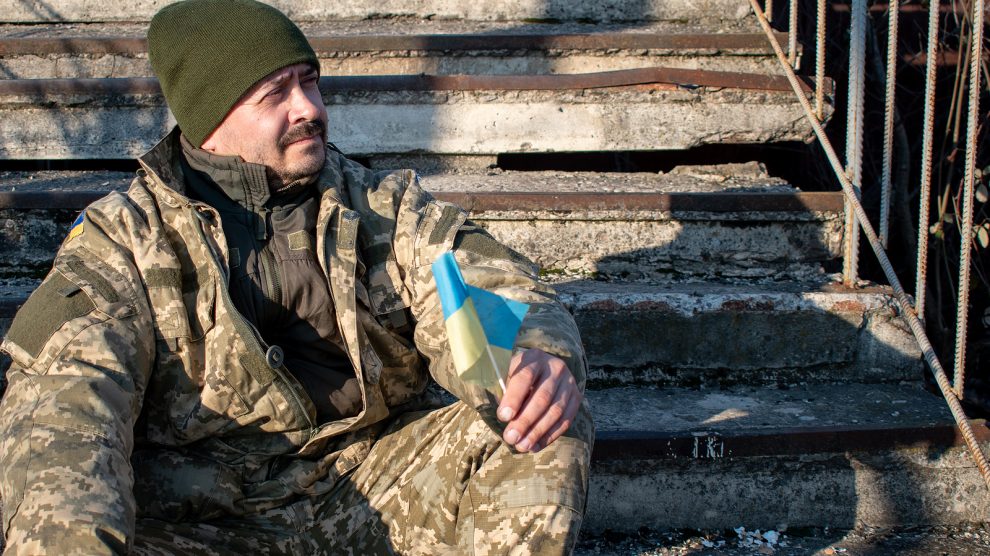These may be tough times for Ukraine, but negotiations between Kyiv and Moscow cannot take place until Moscow’s forces have withdrawn from Ukraine—all of it.
A summit last week of the Organisation for Security and Co-operation in Europe (OSCE) in Skopje, North Macedonia, descended into farce owing to the presence of Russia’s foreign minister, Sergei Lavrov.
The summit was boycotted by Ukraine, Estonia, Latvia, Lithuania and Poland, with Kyiv saying Russia’s presence was “unacceptable”. Delegates from several other countries, including the UK, walked out when Lavrov began speaking.
- What can the EU do about its Viktor Orbán problem?
- In economic terms, Ukraine is unlikely to overburden the EU
- Ukraine’s economy is starting to recover
“While Russia tries to ruin the OSCE, its participating states overwhelmingly support Ukraine,” said Ukrainian Foreign Minister Dmytro Kuleba, while his Polish counterpart Szymon Szynkowski vel Sęk said that he could not ignore, “the fact that the Russian minister of foreign affairs will be present at the table of the organisation that is supposed to build peace and security in Europe.”
Estonian Foreign Minister Margus Tsahkna said that, “Lavrov’s place is at a special tribunal, not the OSCE table.”
Estonia had been widely expected to take on the chairmanship of the organisation next year but its candidacy was vetoed in October by both Russia and Belarus. Malta will instead take the next chairmanship of the OSCE, whose 57 members make it the world’s largest regional security organisation.
Not that everyone was angry at Lavrov’s attendance. The European Union’s foreign policy chief, Josep Borrell, said he understood unease about Lavrov attending the summit, but added that it was a chance for Lavrov to hear “broad condemnation” of Russia’s war in Ukraine.
“Your decision to allow Lavrov to participate is in line with our common objective to keep multilateralism alive,” Borrell told North Macedonia’s Prime Minister Dimitar Kovacevski at a joint press conference. Last year, host country Poland declined to invite Russia to the summit.
Tough days for Ukraine
Ukraine currently faces one of the most difficult periods of the war so far. Its summer counteroffensive was largely ineffectual, not least as it was not provided with the weaponry that could have led to major breakthroughs.
It also now faces losing much of its financial support. Hungary is threatening to block 50 billion euros in new aid from the European Union (as well as Ukraine’s EU accession talks), while in the United States the White House issued an urgent warning to Congress on December 4, predicting that Ukraine will soon lose ground in its war against Russia without another infusion of financial aid from the US.
“I want to be clear: without congressional action, by the end of the year we will run out of resources to procure more weapons and equipment for Ukraine and to provide equipment from US military stocks,” Shalanda Young, the director of the Office of Management and Budget, wrote in her letter to congressional leaders. “There is no magical pot of funding available to meet this moment. We are out of money—and nearly out of time,” she added.
Congress has not approved any new money for Ukraine since control passed to the Republicans in January.
On Ukraine’s western borders meanwhile, Polish and Slovak lorry drivers have blocked crossing points, causing long delays and what Kyiv’s rights ombudsman Dmytro Lubinets has called a “catastrophic” situation.
The Federation of Employers of Ukraine estimates the damage to the country’s economy already exceeds 400 million euros. With most of Ukraine’s Black Sea ports, a key export route before the war, blocked by Russia, Ukraine relies on roads and railways to reroute exports and imports.
However, Polish and Slovak truck drivers are angry at what they view as preferential treatment for their Ukrainian colleagues. In the summer of 2022, as part of its push to create so-called Solidarity Lanes to export Ukrainian goods, the EU lifted permit requirements for Ukrainian lorry drivers entering the bloc.
Polish and Slovak drivers are now demanding that the EU reintroduce the permit system, offering exemptions only for the transport of humanitarian and military supplies.
No time for talks
Ukrainian President Volodymyr Zelensky was last month forced to deny reports that both EU and US officials have spoken with the government in Kyiv about possible peace talks with Russia.
There have also been suggestions that Lavrov’s presence at the OSCE summit, despite the protestations, was a further signal that it might be time for Russia and Ukraine to talk. It took Estonia’s prime minister, Kaja Kallas, to quash such suggestions.
“History has proven time and time again that accommodating Russia will not make it less dangerous,” she said on December 3.
She’s right. There can be no accommodations, and no negotiations with Russia until it has withdrawn its forces from Ukraine—all of it, including Crimea.
Peace in Ukraine must be on Kyiv’s terms, not Moscow’s. At the very least, peace would see Russia immediately withdraw its forces to within its internationally recognised borders. It would hand over suspected war criminals, and it would agree to respect the sovereignty of Ukraine in perpetuity.
It would also agree to make reparation payments to support the cost of Ukraine’s reconstruction. Economic sanctions against Russia could remain in place for a probation period of perhaps five years, after which they could gradually begin to be lifted as and when reparations milestones are reached.
All of this is open to negotiation, but only once Russia has left Ukraine. Until that happens, and despite Ukraine’s current difficulties, there is no time to talk.
Unlike many news and information platforms, Emerging Europe is free to read, and always will be. There is no paywall here. We are independent, not affiliated with nor representing any political party or business organisation. We want the very best for emerging Europe, nothing more, nothing less. Your support will help us continue to spread the word about this amazing region.
You can contribute here. Thank you.


